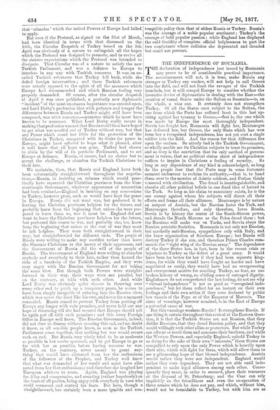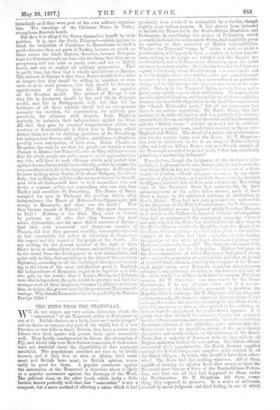THE INDEPENDENCE OF ROUMANIA.
THE declaration of independence just issued by Roumania may prove to be of considerable practical importance. The announcement will not, it is true, make Russia any stronger or Turkey any weaker, will not help to call Greece into the field, and will not limit the ravages of the Turkish ironclads, but it will compel Europe to consider whether the favourite device of diplomatists in dealing with the East—the creation of vassal States under the Sultan as Suzerain—is, on the whole, a wise one. It certainly does not strengthen Turkey. Of all the States once subject to the Sultan, the one from which the Porte has suffered least in this last up- rising against her tyranny is Greece,—that is, the one which was made by Europe the most thoroughly independent. Servia has fought her, Roumania will fight her, Montenegro has defeated her, but Greece, the only State which has won from her a recognised independence, has not yet sent a single soldier into the field. And the reason for that difference lies upon the surface. So utterly bad is the Turkish Government, so wholly unable are its Christian subjects to trust its promises, and so deep is the conviction that its only method of govern- ment is terror, that no political status short of independence
suffices to inspire in Christians a feeling of security. So long as any dependence of any kind is acknowledged, so long do the people fear that the Porte may in some fortunate moment endeavour to reclaim its authority,—that is, to hand them over to the mercies of Asiatic soldiers, and Pashas thinly veneered with civilisation. The dread is inextinguishable, and absorbs all other political beliefs in one fixed idea of hatred to the Turk. So long as his claim to suzerainty exists, he is the one enemy against whom his subjects will direct all their efforts and frame all their alliances. Montenegro is by nature an outpost of Austria, but the Russian hates the Turk, and Montenegro therefore, and only therefore, loves Russia. Servia is by history the centre of the South-Slavon power, and dreads the North Slavons as the Poles dread them ; but the Russians will make war on Turks, and Servia obeys the Russian patriotic Societies. Roumania is not only not Russian, but markedly anti-Russian, sympathises only with Italy, and the laxer organisation of Southern Europe ; but Russia will destroy Turkey if she can, and therefore Prince Charles come mends the "right wing of the Russian army." The dependence of the three States has, in fact, been in the recent crisis as injurious to Turkey as the defeat of a great army. It would have been far better for her if they had been separate king- doms, for while they would have fought no harder and have negotiated as easily, they would have had no overpowering and ever-present motive for assailing Turkey, no fear, no un- broken history of wrong, no abiding sense of outraged dignity. Englishmen do not comprehend the last feeling, do not see why "virtual independence" is not as good as "recognised inde- pendence," but let them reflect for an instant on their own feelings and their own action if they were declared by public law vassals of the Pope or of the Emperor of Morocco. The state of vassalage, however nominal, is in the East of Europe a potential cause of war. But this vassalage weakens Russia? It strengthens Russia. If one thing is certain throughout this revival of the Eastern Ques- tion, it is that the Turkish States are not Russian, that they dislike Russians, that they dread Russian policy, and that they would willingly seek other allies or protectors. But while Turkey can affront or assail them and massacre their brethren, and while the Western Powers, and especially England, uphold Turkey in so doing for the sake of their own "interests," these States are compelled to rely upon the only Power which is heartily upon their side, which will fight for them, which will allow them to see a glimmering hope of that blessed independence. Austria would rather they were not independent. England would rather they were dependent. They are not able until inde- pendent to make legal alliances among each other. Conse- quently they must, in order to succeed, place their resources at the disposal of St. Petersburg ; and the Czar can rely implicitly on the friendliness and even the co-operation of three armies which he does not pay, and which, without him, would not be formidable to Turkey, but with him are as formidable as if they were part of his own military organisa- tion. The vassalage of the Christian States to Turkey strengthens Russia's hands.
But then it is alleged the States themselves benefit by their position. It is, says the Daily Telegraph—which appears to think the subjection of Christians to Mussulmans in itself a good—because they are parts of Turkey, because an attack on them rouses the whole Eastern Question, because European fears for Constantinople are fears also for them, that they are so prosperous, and can raise so much corn, and are so lightly taxed, and can so neglect. all military preparation. That is partly true, but then that is wholly mischievous to Europe. The interest of Europe is that these States should feel a sense of danger, that they should be willing to combine or even unite so as to resist pressure, that they should be driven by apprehension of danger from the North to organise on the Prussian model. The interest of Europe is not that life in Bucharest should be lax, and life in Belgrade sordid, and life in Philippopolis dull, but that the in- habitants of all these capitals should feel an ever-present necessity for exertion, for organisation, for military pre- parations, for alliances with Austria, Italy, England, anybody, to maintain their independence against the Czar. All that they gain by nominal comprehension within the territory of Constantinople is direct loss to Europe, which desires them not to be outlying provinces of St. Petersburg, but independent States, with policies, ambition-3, civilisations, possibly even enterprises, of their own. Prince Charles, as Hospodar, has only to see that his people can furnish a corps d'armee to Russia ; but Prince Charles as King will have to see that his whole people are under arms to resist aggression from any side, will have to seek alliances which may protect him against the one Power which is nowhis ally,—that is, against the very combination held to be dangerous to Europe. As Hospodar he cares nothing about Sonia, little about Hungary, less about Italy ; but as King he will have the warmest interest in friendli- ness with all three,—will have to seek counsellors who can devise a separate policy,-not counsellors who can only hate Turkey and conciliate St. Petersburg. The House of Savoy occupied for ages in Piedmont the position which, after independence, the House of Hohenzollern-Sigmaringen will occupy in Roumania, and what was the result ? That they became vassals of France ? That they grew dangerous to Italy ? Nothing of the kind. They were so trained by pressure on all sides that they became the most astute diplomatists, and the most skilful warriors of Europe ; that they were permanent and dangerous enemies of France, and that they pursued steadily, unscrupulously, and at last successfully the policy of attracting to themselves the respect and the regard of the people of the South. We say nothing for the present moment of the right of these States to be as independent as Greece, and nothing of the gain to the world from the development of new nationalities, and point only to this, that according to the ideas of the narrowest diplomacy, according to all the teaching of history, and accord- ing to the views of the most anti-Russian party in England, the independence of Roumania ought to be regarded as a defi- nite gain to the world ; that if Bosnia, Servia, and Bulgaria were also independent, the gain would be greater; and that the stronger each of these kingdoms becomes by alliance, or federa- tion, or fusion, the greater must be the permanent European ad- vantage. Why should Roumania wish to be guided by the Russian Foreign Office?



































 Previous page
Previous page